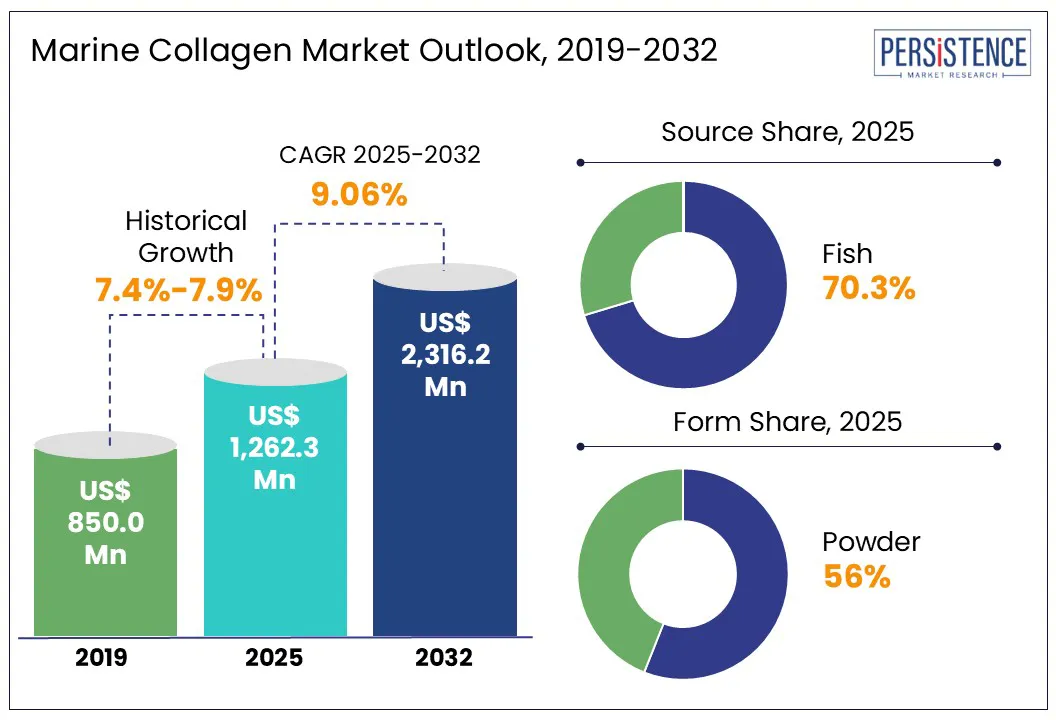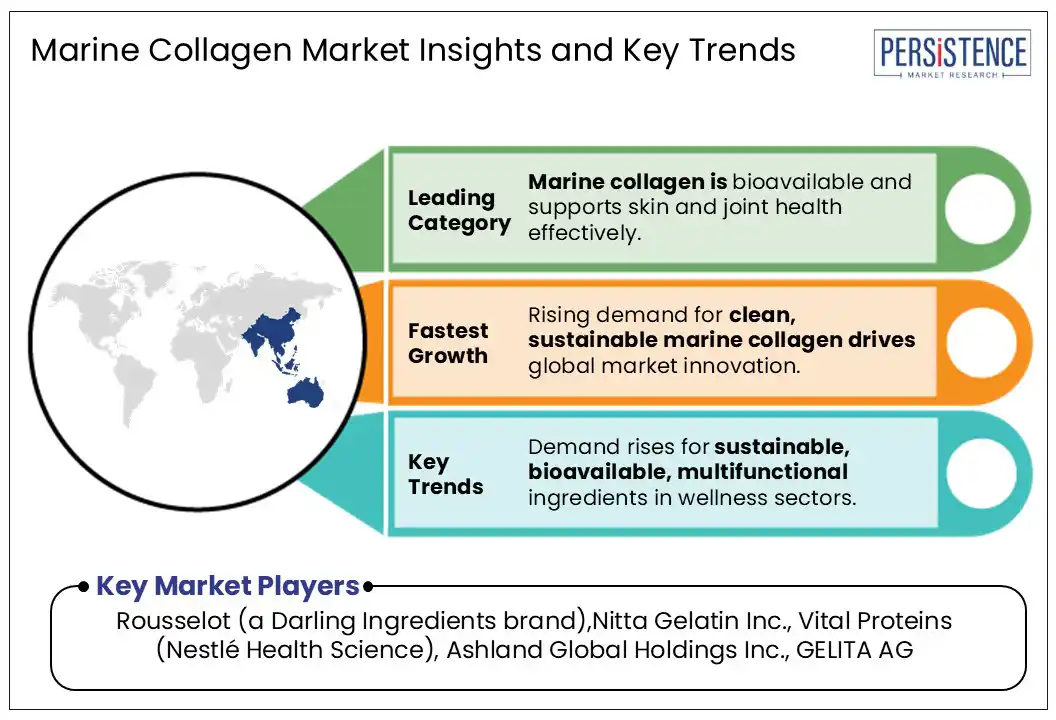ID: PMRREP35434| 194 Pages | 18 Jun 2025 | Format: PDF, Excel, PPT* | Food and Beverages

The global marine collagen market is projected to grow from US$ 1,262.3 Mn in 2025 to US$ 2,316.2 Mn, exhibiting a CAGR of 9.06% by 2032.
Increase in consumer demand for sustainable, bioavailable, and multifunctional ingredients in the health, beauty, and nutrition sectors drives the adoption of cosmetics & beauty products. Marine collagen, primarily derived from fish skin, bones, and scales. It is gaining traction due to its better absorption rate and minimal allergenic characteristics compared to bovine or porcine sources used in cosmetic products.

Key Industry Highlights
|
Global Market Attribute |
Key Insights |
|
Marine Collagen Market Size (2025E) |
1,262.3 Mn |
|
Market Value Forecast (2032F) |
2,316.2 Mn |
|
Projected Growth (CAGR 2025 to 2032) |
9.06% |
|
Historical Market Growth (CAGR 2019 to 2024) |
7.4%-7.9% |
The market is experiencing growth primarily driven by the rising global demand for skincare and anti-aging solutions. Marine collagen extracts contain Type I collagen, which is well-known for its bioavailability and effectiveness in improving skin elasticity, deep hydration, and wrinkle reduction. As a result, it is increasingly used in both topical and ingestible beauty products, particularly in North America and Asia Pacific, where beauty-from-within trends are gaining traction. Another important factor is the increasing health consciousness of aging populations. With increasing consumer knowledge about joint, bone, and gut health, marine collagen supplements are increasingly being integrated into daily wellness routines.
Sustainability market growth advantage is also an important factor. Marine collagen is mainly obtained from fish skin, bones, scales, and byproducts of the seafood industry. This not only reduces waste but also aligns with circular economy principles, making it an eco-friendly alternative to land animal-derived collagen. The advancement of marine collagen into functional foods and beverages is creating new opportunities for market expansion. Health-conscious consumers with busy lifestyles looking for easy, nutritious options are increasingly reaching for collagen-enriched waters, protein bars, and health drinks.
Additionally, the industry is benefiting from the clean-label movement. Consumers are increasingly seeking natural, allergen-free, and minimally processed ingredients. Marine collagen fits well within this trend due to its traceable sourcing and minimal processing requirements. Emerging applications in pet nutrition and bioplastics are also contributing to market expansion. Marine collagen is being used in premium pet supplements to support joint and coat health, while its film-forming properties are being explored for biodegradable packaging solutions.
Despite its promising growth trajectory, the marine collagen market faces several challenges that could hinder its expansion. One of the primary restraints is the dependency on the seafood industry for raw material supply. Marine collagen is predominantly extracted from fish skin, bones, and scales, the byproducts of fish processing. This makes the market highly sensitive to fluctuations in fish catch volumes, seasonal availability, and disruptions in the seafood supply chain.
Another significant challenge is the high production cost associated with marine collagen. Compared to bovine or porcine collagen, marine collagen is more expensive to extract and process based on the need for advanced purification techniques and odor-removal processes. The cost factor limits its adoption in price-sensitive markets and restricts its use in mass market products, especially in developing economies.
Regulatory complexity also poses a barrier to market growth. The classification of marine collagen varies across regions, being treated as a food ingredient, dietary supplement, or cosmetic additive depending on local laws. This inconsistency complicates product development and international trade. Consumer skepticism and a lack of awareness in certain regions may also slow adoption.
The marine collagen industry is on the verge of tremendous growth with an upsurge in new opportunities in various industries. Among the most promising markets is the functional food and beverage industry, where marine collagen is added to protein bars, collagen-enriched waters, and ready-to-consume wellness drinks. Such products appeal to those looking for easy to consume, health-enhancing products that promote skin, joint, and digestive health.
The other significant opportunity comes from the nutricosmetics business, where edibles for beauty are becoming increasingly popular. Marine collagen's capacity to enhance skin elasticity and diminish age signs makes it an essential ingredient in beauty from within products. With consumers looking more and more for an integrated approach to skincare, demand for marine collagen for this purpose should grow fast. The market is also extending to pet nutrition, where marine collagen is being incorporated in high end supplements to promote joint wellbeing, skin strength, and coat condition in pets. This fits with the trend towards pet humanization and the desire for high quality, functional pet products. Marine collagen is also being investigated for applications in biodegradable products and environmentally friendly packaging.
Marine collagen is primarily derived from fish, particularly the skin, bones, and scales, which are rich in Type I collagen. This form is highly bioavailable and widely recognized for its benefits to skin and joint health. While still emerging, algae-based collagen alternatives are gaining attention for their sustainability and appeal to vegan consumers. Other marine sources, such as jellyfish and invertebrates are explored for their potential in specialized applications.
Powdered marine collagen remains the most prevalent format due to its versatility, ease of use, and long shelf life. It blends seamlessly into beverages and foods, making it a convenient choice for daily supplementation. Liquid collagen though less common is growing in popularity particularly in wellness drinks and beauty shots, due to its rapid absorption, despite its higher cost and shorter shelf life.
Marine collagen is increasingly featured in functional foods and beverages, such as protein bars and collagen-infused drinks, catering to consumers seeking convenient health solutions. The dietary supplements segment leads the market, with products designed to support skin, bone, and joint health. In cosmetics, marine collagen is valued for its hydrating and anti-aging properties, both in topical and ingestible forms. Additional applications include pet nutrition, biodegradable packaging, and medical-grade uses for wound healing.

Asia Pacific is the dominant region in the marine collagen market, accounting for approximately 41.21% of the global share in 2024.
Japan, South Korea, and China are leading the charge due to their strong cultural emphasis on beauty, wellness, and functional foods. The region benefits from a well-established seafood industry, which provides a steady supply of raw materials for collagen extraction. Additionally, the popularity of nutricosmetics and anti-aging supplements is driving demand in both urban and rural markets. Government support for sustainable aquaculture and marine biotechnology further strengthens the region’s leadership.
North America is projected to witness significant growth, with the U.S. market alone expected to reach US$ 473.4 Mn by 2032. The region’s growth is fueled by rising consumer awareness of clean-label and sustainable products, along with a strong demand for collagen-infused functional foods and beverages. The U.S. has a rising geriatric population that is increasingly turning to marine collagen for joint, bone, and skin health. Regulatory clarity and a robust nutraceuticals industry support innovation and product launches.
Europe is emerging as a key market, driven by strict sustainability standards and a growing preference for traceable, ethically sourced ingredients. Germany, France, and the UK are witnessing increased adoption of marine collagen in both supplements and cosmetics. The European Union’s focus on circular economy practices and marine conservation is encouraging manufacturers to invest in eco-friendly sourcing and production methods. Additionally, the region’s aging population and demand for natural anti-aging solutions are boosting market growth.
Latin America is an emerging market with growing interest in marine collagen, particularly in Brazil and Mexico. The region is witnessing increased demand for beauty-from-within products and functional nutrition, although market penetration is still in the early stages. Local seafood industries offer potential for raw material sourcing, but infrastructure and regulatory frameworks are still developing.
The MEA region is gradually adopting marine collagen, especially in the Gulf Cooperation Council (GCC) countries, where there is a rising demand for premium beauty and wellness products. However, limited local production and high import dependency may restrict growth in the short term. Awareness campaigns and partnerships with global brands could help accelerate adoption.
The global marine collagen market features intense competition among firms regarding factors such as product development, brand visibility, pricing strategies, and distribution channels. Well-established companies with a strong market presence leverage their reputation to foster consumer trust and loyalty.
Pricing strategies are essential for sustaining competitiveness and profitability. Efficient distribution channels, encompassing alliances and online commerce, expand market accessibility. Regulatory compliance ensures product safety and quality, setting apart trustworthy providers in a competitive marketplace.
Marine collagen is a type of collagen derived from fish skin, bones, and scales. It primarily contains Type I collagen, which is known for its high bioavailability and effectiveness in promoting skin, joint, and bone health. It is considered more sustainable and less allergenic than bovine or porcine collagen.
The global marine collagen market is expected to reach approximately US$ 2,316.2 Mn by 2032, growing at a CAGR of 9.06% from 2025.
Asia Pacific accounts for the largest market share, driven by strong demand in Japan, China, and South Korea. North America and Europe are also significant markets due to rising health awareness and demand for clean-label products.
Marine collagen is widely used in dietary supplements, functional foods and beverages, cosmetics, and medical-grade products. It is also gaining traction in pet nutrition and biodegradable packaging.
While marine collagen itself is not vegan, algae-based collagen alternatives are being developed to cater to vegan and plant-based consumers.
|
Report Attribute |
Details |
|
Historical Data/Actuals |
2019 - 2024 |
|
Forecast Period |
2025 - 2032 |
|
Market Analysis Units |
Value: US$ Bn/Mn, Volume: As Applicable |
|
Geographical Coverage |
|
|
Segmental Coverage |
|
|
Competitive Analysis |
|
|
Report Highlights |
|
|
Customization and Pricing |
Available upon request |
By Source
By Form
By Application
By Region
Delivery Timelines
For more information on this report and its delivery timelines please get in touch with our sales team.
About Author